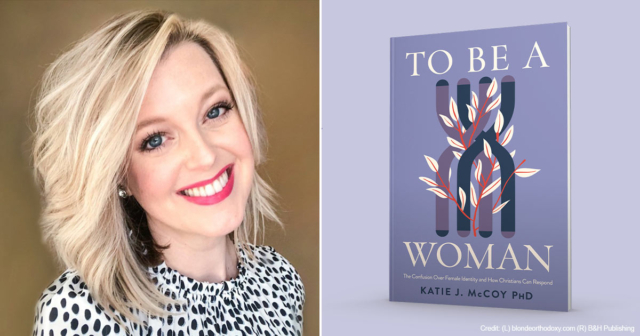‘What Is a Woman?’ Katie McCoy’s New Book Provides Biblical Clarity

Conversations surrounding gender and sexuality are seemingly inescapable these days, and Christians today are increasingly being labeled as “hateful” by those who disagree with a biblical worldview. In these contentious times, it is more necessary than ever that Christians approach these topics both biblically and lovingly.
Despite the ubiquity of these topics, many Christians shy away from the conversation for fear of being “canceled” or for lack of knowledge about what has become a complicated battlefield of ideas. However, Christians must join the discussion because gender ideology is causing real harm to the most vulnerable among us: children.
Although gender ideology has a detrimental effect on children of both sexes, it is having an outsized effect on young women. As our culture’s answer to the question “What is a woman?” becomes more and more uncertain, young women are being inundated with contradictory ideologies that lead to harmful physical consequences. At her March 2022 confirmation hearing, Ketanji Brown Jackson epitomized our culture’s confusion when the future Supreme Court justice declined to define the word “woman.”
Katie McCoy’s new book “To Be a Woman” is an important contribution to the conversation about how Christians can answer the day’s toughest questions about sexuality and gender with love, compassion, grace, and wisdom. McCoy sheds light on what has become a difficult topic, specifically addressing how young women are disproportionately affected.
If we are going to respond to our culture with love and knowledge, we must first properly understand the basics of the conversation we are undertaking. McCoy seeks to explain the “confusion over female identity and how Christians can respond” with a five-part model: the How, the Why, the Where, the What, and the Who.
The How addresses the social catalysts that have created an environment that cultivates disorder and confusion about gender and sexuality. The “epidemic” that has become known as rapid-onset gender dysphoria (ROGD) affects young women more frequently than young men, and the influence of online resources that encourage ROGD means that the standard of care is causing increasingly more harm.
The Why analyzes the ingredients and ideologies that have combined to create a world that sustains these influences and discussions. From the rise of the postmodern worldview to the growing distrust of society and authority and, more importantly, the separation of God from culture, our society has broken down the fundamental attributes of gender, and this has become a harmful recipe that results in “toxic, dangerous, and corrosive” behavior.
The Where presents the science behind “treatment” for rapid-onset gender dysphoria and how the validation of gender identity leads to harmful physical consequences that society views as “loving treatments.” However, these validations, ranging from fake periods to new pronouns, attempt to separate the connection between biology and gender, to which McCoy responds well by clarifying, “Gender is distinct from biology, but it is still derived from biology.”
The What breaks down the biological differences between the sexes that are so stark they cannot be ignored. Contemplating the many physiological and neurobiological differences present in human anatomy helps readers navigate the labyrinth of gender topics and remind us that we should be in awe of and not overwhelmed by the complexity that God created in us.
The Who connects the meaning of gender and womanhood to the context of the Bible and the healing that society needs to undergo in order to repair women’s relationships with their physical bodies. Commenting that “maleness and femaleness have a purpose,” McCoy brings the discussion back to God’s plan for humanity and reflects on the deeper meaning of being “made in His image.”
Chapter Six rounds out the conversation by offering more evidence on why the topic of womanhood ought to be important to Christians and places this conversation in the reality of the family unit and everyday life.
In the final chapter, McCoy charges Christians to have compassion and love for others. God commands His people in Leviticus 19 to “love your neighbor as yourself.” Christians are called to follow these commandments given by God even when it is difficult.
With so much confusion and ambiguity plaguing our society’s conversations about gender and sexuality, it is important for Christians to maintain a solid understanding of the battle of ideas that is taking place. Katie McCoy provides a straightforward and clear introduction to the topic that can help believers navigate these conversations effectively and graciously.
AUTHOR
Abigail Odom
Abigail Odom is an intern at Family Research Council.
RELATED PODCAST: Confusion, Feminism, and What it Really Means to Be a Woman
EDITORS NOTE: This Washington Stand column is republished with permission. All rights reserved. ©2023 Family Research Council.
The Washington Stand is Family Research Council’s outlet for news and commentary from a biblical worldview. The Washington Stand is based in Washington, D.C. and is published by FRC, whose mission is to advance faith, family, and freedom in public policy and the culture from a biblical worldview. We invite you to stand with us by partnering with FRC.


Leave a Reply
Want to join the discussion?Feel free to contribute!